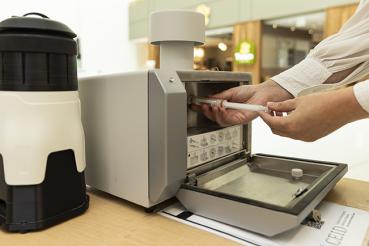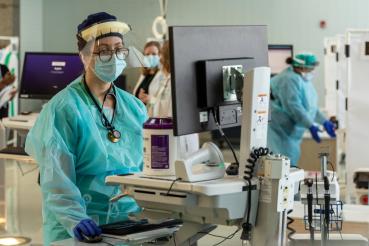COVID-19 has been around for most of 2020, and we're learning more about the disease every day. Unfortunately, there's still a lot of misinformation circulating on the internet and social media.
It can be easy to jump down a rabbit hole of fake news when surfing the web or scrolling through your Facebook or Twitter feed. This misinformation can lead to paranoia and can even cause someone to try something dangerous in an effort to cure or prevent COVID-19.
How do you tell fact from fiction? The answer is simpler than you think: Do your own research.
When you see a post on social media, don’t assume it's true. It’s OK to question a post and search for answers on your own. Reading news from trusted news sites and medical system websites like rush.edu is a great way to stay informed without being misled. And if you see a story online that appears accurate but still seems far-fetched, use websites like Snopes, factcheck.org or the AP fact check page to verify the story's accuracy before you start sharing it with others.
The truth behind common COVID-19 myths
While it’s always important to do your own research, for your convenience we have compiled a list of the common myths we've seen so far during the pandemic — and indicated whether or not they are valid.
COVID-19 isn't as serious as the seasonal flu.
FALSE: While most COVID-19 cases will be mild, and most patients will only show seasonal flu symptoms, this disease has a high mortality rate, specifically among older people and those who are immunocompromised.
Ordering or buying products shipped from China will make a person sick.
FALSE: There is no evidence to show that there has been transmission through packages. Officials say because of the poor survivability of these coronaviruses on surfaces, there is likely very low risk of spread from products or packaging that are shipped over a period of days or weeks at ambient temperatures.
While you may not be experiencing symptoms, it's important to practice social distancing to protect yourself and the people around you.
Wearing a mask will protect me from COVID-19.
TRUE, BUT ...: There is evidence that wearing a mask does offer some protection for you, if worn properly (coverying your mouth and nose), but most masks do not guarantee that you'll be protected against COVID-19 infection.
However, the primary purpose of wearing a mask or face covering is to prevent you from spreading an infection to someone else. This is especially important because carriers of COVID-19 can be asymptomatic.
The CDC recommends wearing cloth face coverings in public settings where other social distancing measures are difficult to maintain, like stores, restaurants or crowded outdoor areas.
It’s important to remember that the best way to prevent COVID-19 from spreading is to stay home. If you do go out, do your part to protect yourself and others: Practice universal masking plus good hand hygiene and social distancing.
Young people can't get the virus.
FALSE: People of all ages can be infected by COVID-19. Older people and people with pre-existing medical conditions (such as asthma, diabetes, heart disease) appear to be more vulnerable to becoming severely ill with the virus. Everyone should take steps to protect themselves from the virus, for example, by following good hand hygiene.
Black people can't get the virus.
FALSE: People of all races and ethnicities can be infected by COVID-19. The virus has been detected in the United States and across the world in people regardless of their race and ethnicity. Everyone should take steps to protect themselves from the virus, for example, by following good hand hygiene.
I'm healthy, so I don’t need to practice social distancing.
FALSE: While you may be healthy, you could still be a carrier of the virus. You also increase your risk of getting infected and then spreading it to others who may be at a higher risk for severe illness. While you may not be experiencing symptoms, it's important to practice social distancing to protect not only yourself but the people around you.
Pets can spread the virus.
FALSE: There is no evidence to suggest that household pets are carriers of COVID-19. It is still recommended that you practice good hand hygiene after handling pets.
You can protect yourself by gargling bleach or using essential oils.
FALSE: Gargling bleach will not protect you from COVID-19 and is very dangerous, even deadly. Things that can help protect you from infection include washing your hands with soap and water for 20 seconds, avoiding touching your face, and wiping down surfaces.
Home remedies like herbal teas, garlic, ginger and ginger ale can cure or prevent the virus.
FALSE: While doctors around the world are working on a COVID-19 vaccine, there is no cure for the virus. Home remedies are not effective against the virus. To protect yourself wash your hands regularly, stay at home and practice social distancing.
If you drink warm water, it will rinse the virus from your throat.
FALSE: There is no evidence that drinking warm water has protected people from infection with the new coronavirus. Regularly rinsing your throat has not been shown to prevent respiratory infections. Warm water with soap works best for washing hands to fight COVID-19.
Hot air/hair dryers kill the virus.
FALSE: Hand dryers are not effective in killing the COVID-19 virus. To protect yourself against the new coronavirus, you should frequently clean your hands with an alcohol-based hand rub or wash them with soap and water. Once your hands are cleaned, you should dry them thoroughly by using paper towels or a warm air dryer.
The virus cannot survive in warm weather.
FALSE: While many cold/flu viruses tend to drop out during the warmer months, this has not been the case with COVID-19. In fact, many areas have experienced surges in the virus during the summer.
The virus spreads through 5G.
FALSE: Viruses cannot travel on radio waves/mobile networks. COVID-19 is spreading in many countries that do not have 5G mobile networks. COVID-19 is spread through respiratory droplets when an infected person coughs, sneezes or speaks. People can also be infected by touching a contaminated surface and then their eyes, mouth or nose.
So relax: You can still use your cellphone. You can also go old school by writing letters to loved ones, sharing recipes and cooking meals together virtually.
If I have had the COVID-19 virus and am now recovered, I am immune.
PROBABLY FALSE: Because this is a newer virus, we still have a lot to learn about it. Since we've seen cases of people testing positive for the virus weeks or months after recovering, it's likely that having COVID-19 once does not mean you cannot get the virus again.
Since immunity is not a guarantee, wash your hands, stay at home and keep your distance to protect yourself and those around you.
The COVID-19 virus is not new. There are already vaccines for it or disinfectants that can kill it.
FALSE: The current version of the coronavirus is new. To date, there is no specific medicine recommended to prevent or treat the new COVID-19 virus. There is also no disinfectant that can kill the virus.
These are just some of the myths out there. As this global pandemic continues, it’s more important than ever to stay informed. Just make sure to always fact-check what you are seeing on social media before you take any actions or make any decisions for yourself or your family.
Sources: (WHO) Q&A on coronaviruses (COVID-19) and (WHO) Coronavirus disease (COVID-19) advice for the public: Myth busters




